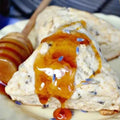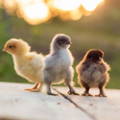
Choosing the Right Chickens for Your Backyard Flock
Consider these factors before selecting poultry breeds for your backyard flock. By selecting the right breeds, you will be rewarded with a flock that can provide eggs as well as enjoyment and entertainment for your family.
FUN FACT: The average backyard chicken lives 5-10 years. There is a hen named Peanut that is currently 21 years old and holds the world record.
Subscribe
To join our mailing list and never miss an update!
When starting a backyard flock of chickens, there are several essential factors to consider when selecting the right breeds for your family. Each factor contributes to the overall success and productivity of your flock. Here are some key considerations for you to ponder when choosing the best chickens for your backyard flock.
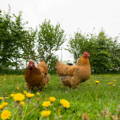
1. Broilers vs. Egg Layers
Setting clear goals for your family flock is a critical first step. Some chicken breeds have been specifically bred for rapid growth and large breast size, making them ideal for meat production after just 12 weeks. While these breeds are excellent choices if you're primarily interested in a meat supply, they might not be the best fit for your goals of egg production.
However, these birds will not have the same lifespan in a family flock because their rapid growth and weight gain put a tremendous stain on their internal organs. Expect these birds to live only 1-3 years in a family flock.
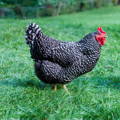
2. Climate Compatibility
It’s critical to consider your local climate when choosing chickens for your flock. Different chicken breeds are better suited to different weather conditions. For example, some breeds are more cold-hardy, while others thrive in hot weather.
If you live in a cold climate, hearty breeds like the Rhode Island Red or Plymouth Barred Rock can handle the chill, while in a hot climate, you might prefer the heat-tolerant Leghorn or Ayam Cemani. If you decide to add a breed to your flock such as bantam Modern Fowl, these birds will require special attention to bring them inside during nights below freezing in your area.
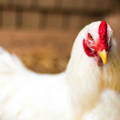
3. Flock Size
Consider how many chickens you plan to keep in your flock. It takes a hen roughly 24 hours to produce and egg. However, they don’t they an egg every day of the year. Some will lay for a few months and then stop for a while. You will see a decline in egg production from all breeds during the months when sunlight hours are reduced in your region.
If you're looking for a small family supply of eggs, a few hens might be sufficient. However, if you have a larger family or want to share with neighbors, you'll need a breed that produces a higher number of eggs.
Smaller breeds like the Bantam Silkie or Serama are not going to produce the quantity and size of eggs you desire for cooking on a regular basis. White Leghorn, Black Australorp, Easter Eggers and Barred Rock breeds are all prolific layers.
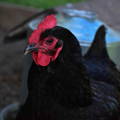
4. Unique Breeds for Visual & Educational Appeal
It’s always fun to incorporate some unique breeds into your flock for the sheer visual appeal and interesting physical characteristics. For example, the Ayam Cemani chicken is all black, inside and out. Even the meat and bones of the ayam cemani are black. Polish and other crested poultry breeds are always a fun addition to the backyard chicken flock because of their beautiful head plumage and ditzy personalities.
Trending Articles
5. Feathered Feet or Not
Feathered feet and shanks are characteristic to many poultry breeds. While this adds visual interest, they can also get caked in mud and often require additional grooming care as compared to chickens with no feathers on their feet.
If you live in an area where you receive a lot of rain or if your chicken yard is going to be grass free, feather-footed poultry breeds may be a hard pass for you.
6. Space Requirements
The space you have available for your chickens should determine the breeds you choose for your flock. Some breeds require more room to roam and forage, while others are content in smaller areas.
If you have limited space, breeds like the Sussex or Wyandotte are good options, while foragers like the Rhode Island Red or Orpington can thrive in larger areas.

7. Temperament
Chicken breeds have different temperaments. Some are docile and friendly, making them suitable for family settings, especially if you have children. The Ayam Cemani, Bantam Modern Fowl, Orpington or Wyandotte are known for their docile nature. On the other hand, breeds like the White Leghorn or Hamburg may be less affectionate and more skittish.
With that being said, all of your chickens can be well socialized and safe for family members if you spend regular daily time interacting with them as they mature to adulthood. Chickens have been domesticated centuries and are very intelligent. Daily handling will ensure that your poultry fit into your family lifestyle and bring joy for years to come.
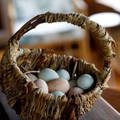
8. Egg Characteristics
Not all eggs are the same. Some chicken breeds lay eggs of specific sizes and colors. If you have a preference for brown, white, or even blue eggs, research breeds that align with your egg color desires.
For brown eggs, breeds like the Rhode Island Red or Plymouth Barred Rock are great choices. If you prefer white eggs, consider the White Leghorn or Ancona. For blue or green eggs, the Araucana and Easter Eggers are known for their colorful eggshells.
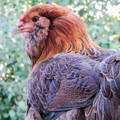
9. Feed Consumption
The cost of keeping a flock can vary depending on the breed. Some breeds are known for being more efficient feed converters, meaning they require less feed to produce eggs.
If you're concerned about feed costs, breeds like the Rhode Island Red or Sussex are efficient feed converters. However, breeds like the Plymouth Rock and Buff Orpington have average feed efficiency.
10. Health and Disease Resistance
Chickens can be susceptible to various health issues, depending on their breed. Research breeds that are known to be more resistant to common diseases and health problems in your region. Hardy breeds like the Black Australorp and Rhode Island Red are known for their resilience.
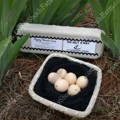
11. Age and Egg Production Stages
Some chicken breeds are more prolific egg layers when they are younger, while others continue to lay eggs consistently throughout their lives. If you prefer chickens that lay a lot of eggs when they're young and slow down sooner, consider the White Leghorn or Golden Comet. If you want a steady supply of eggs over a more extended period, breeds like the Rhode Island Red or Plymouth Rock are good choices.
It is worth mentioning that all poultry breeds will decline in egg production with age. As a general rule, you will see the highest egg production in years 1-3, with a normal decline each year thereafter.
By considering these factors and the breed recommendations provided, you'll be better equipped to select poultry breeds that suits your climate, flock size, space, temperament preferences, egg characteristics, feed costs, health needs, and age-related considerations.
With the right breeds, you'll be rewarded with a flock that not only provides delicious eggs for your family but also brings joy and entertainment to your backyard.
Trending Products
Copyright©2023 All rights reserved. We love to have you share our article as long as you include a direct link to this page. This article or any portion thereof , including all images, may not be reproduced or used in any manner whatsoever without the express written permission of Gypsy Shoals Farm.

